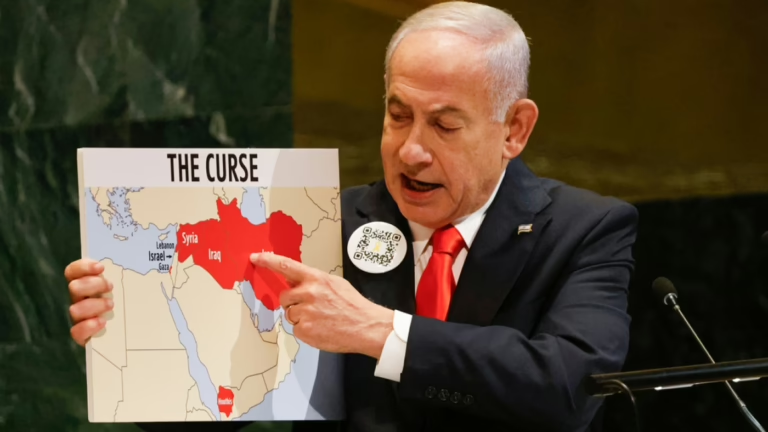Israeli Prime Minister Benjamin Netanyahu displays a map while addressing the 80th session of the United Nations General Assembly at the U.N. headquarters.
Stefan Jeremiah/AP
hide caption
toggle caption
Stefan Jeremiah/AP
NEW YORK – Surrounded by dissent and vocal opposition at the United Nations, Israeli Prime Minister Benjamin Netanyahu delivered a resolute address on Friday, asserting that Israel must “complete the mission” against Hamas in Gaza. Despite mounting global criticism and increasing diplomatic isolation due to his steadfast refusal to halt the ongoing conflict, Netanyahu remained unyielding. “While some Western leaders may have succumbed to pressure,” he declared, “Israel will not.”
His speech commenced amid a dramatic walkout by numerous delegates from various countries, who exited the General Assembly hall in protest.
Addressing recent international moves to recognize Palestinian statehood, Netanyahu condemned these decisions as “shameful acts that will fuel terrorism against Jewish communities and innocent civilians worldwide.”
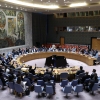
Throughout Netanyahu’s address, the hall was filled with a mix of jeers and applause. The United States delegation, a staunch supporter of Netanyahu’s campaign against Hamas, remained seated, while other major powers such as the United Kingdom and the U.S. refrained from sending their top diplomats, instead delegating junior officials to fill their seats.
“Antisemitism is a persistent threat; it never truly disappears,” Netanyahu stated, a frequent refrain in his speeches where he accuses critics of harboring antisemitic motives.
Facing accusations of war crimes and increasing international pressure to cease hostilities, Netanyahu used this high-profile platform to defend his policies and rally support.
In a familiar tactic, Netanyahu presented a map labeled “THE CURSE,” annotating it with a marker to emphasize his points. He wore a distinctive pin featuring a QR code linking to a website dedicated to the events of October 7, designed for international public diplomacy. His entire delegation sported matching pins.
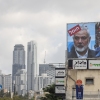
Netanyahu also lauded former U.S. President Donald Trump, highlighting their shared vision and cooperation in reshaping Middle Eastern geopolitics. He revealed that Israel has initiated talks with Syria aimed at establishing security arrangements with the new Syrian government.
Back home, Israeli authorities took extraordinary measures to ensure Netanyahu’s message reached Gaza. Loudspeakers were installed along the Israel-Gaza border to broadcast his speech, and in an unprecedented move, the Israeli military announced plans to hijack mobile phones belonging to Gaza residents and Hamas operatives to transmit the address live. However, journalists inside Gaza reported no immediate signs that the speech was being aired on local devices.
Heightened global attention on Netanyahu’s address
Netanyahu’s annual U.N. General Assembly speech is traditionally a focal point for international scrutiny, often sparking protests and strong rhetoric. This year, however, the stakes are significantly elevated.
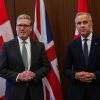
Recently, countries including Australia, Canada, France, and the United Kingdom have formally recognized Palestine as an independent state. The European Union is contemplating imposing tariffs and sanctions on Israel, while the U.N. General Assembly passed a nonbinding resolution urging Israel to endorse Palestinian statehood-a proposal Netanyahu has firmly rejected.
Meanwhile, the International Criminal Court has issued an arrest warrant accusing Netanyahu of crimes against humanity, allegations he denies. The International Court of Justice is also reviewing South Africa’s claim that Israel has committed genocide in Gaza, a charge Israel strongly disputes.
Despite these challenges, Netanyahu remained steadfast as he departed Israel for the U.N. summit in New York. “I will present our narrative,” he vowed. “I will denounce those leaders who, instead of condemning the murderers, rapists, and child burners, seek to grant them a state within Israel’s heartland.”
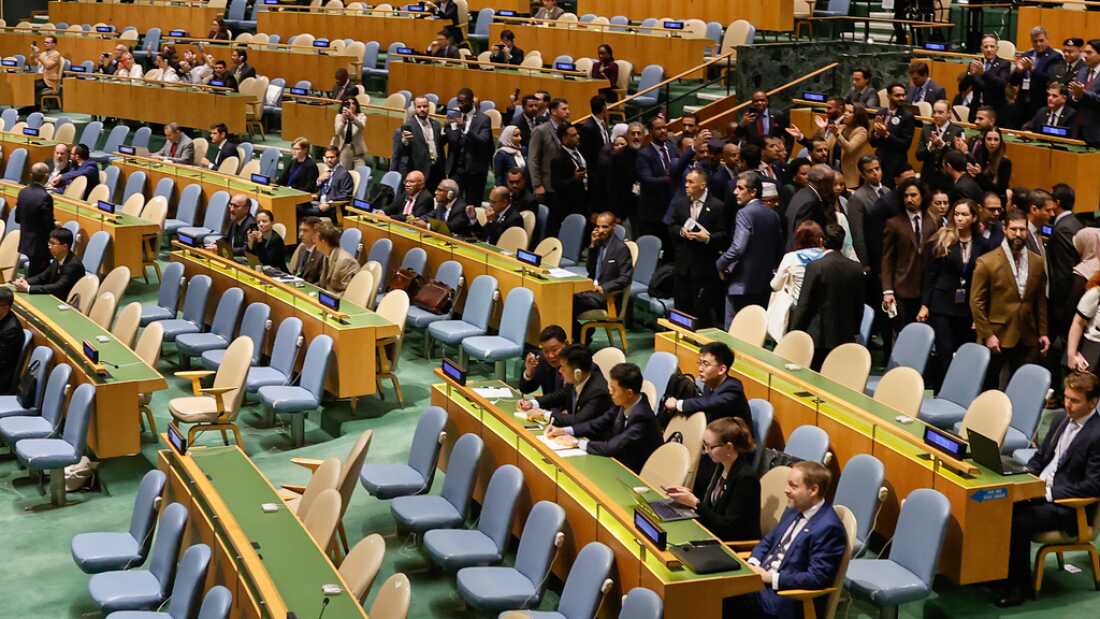
Delegates depart the General Assembly hall on Friday as Israeli Prime Minister Benjamin Netanyahu steps up to deliver his speech at the 80th United Nations General Assembly.
Stefan Jeremiah/AP
hide caption
toggle caption
Stefan Jeremiah/AP
Rising opposition to Netanyahu’s policies
During a special U.N. session earlier this week, numerous nations expressed shock and condemnation over the 2023 Hamas attack that resulted in approximately 1,200 Israeli deaths and 251 hostages, igniting the current war. Many delegates called for an immediate ceasefire in Gaza and increased humanitarian aid.
Israel’s extensive military campaign has resulted in over 65,000 Palestinian deaths in Gaza and displaced nearly 90% of its population, with starvation becoming an escalating crisis.

While over 150 countries have recognized Palestinian statehood, the United States remains a notable exception, continuing to offer robust support to Israel. However, former President Trump indicated limits to this support, stating he would oppose any Israeli annexation of the West Bank.
Although Israel has not formally announced annexation plans, several senior figures within Netanyahu’s government advocate for it. Recently, authorities approved a contentious settlement project that would effectively bisect the West Bank, a move critics argue would extinguish hopes for a viable Palestinian state. Netanyahu and Trump are slated to meet during the U.N. gathering.
Netanyahu’s office also confirmed coordination with the military to deploy loudspeakers mounted on trucks along the Israeli border, broadcasting his speech in a manner designed to avoid endangering soldiers.
Palestinian leadership voices at the U.N.
Palestinian President Mahmoud Abbas addressed the General Assembly via video on Thursday after being denied a U.S. visa. He welcomed the recent recognitions of Palestinian statehood but urged the international community to take further action to realize Palestinian sovereignty.
“The moment has arrived for the global community to stand with the Palestinian people,” Abbas said, emphasizing the need to end occupation and free Palestinians from the constraints imposed by Israeli political dynamics.
Abbas heads the Palestinian Authority, which governs parts of the West Bank. Hamas, which won Gaza’s 2006 legislative elections and seized control in 2007, remains a separate entity.
Israel captured the West Bank, East Jerusalem, and Gaza during the 1967 Middle East war but withdrew from Gaza in 2005. Palestinians seek these territories to establish their envisioned state under the long-supported two-state solution.
Netanyahu firmly rejects this framework, arguing that establishing a Palestinian state would embolden Hamas. “That will not happen,” he asserted at the airport before departing for New York.

















